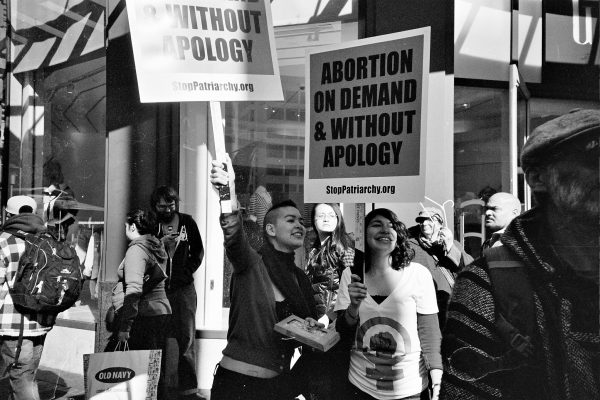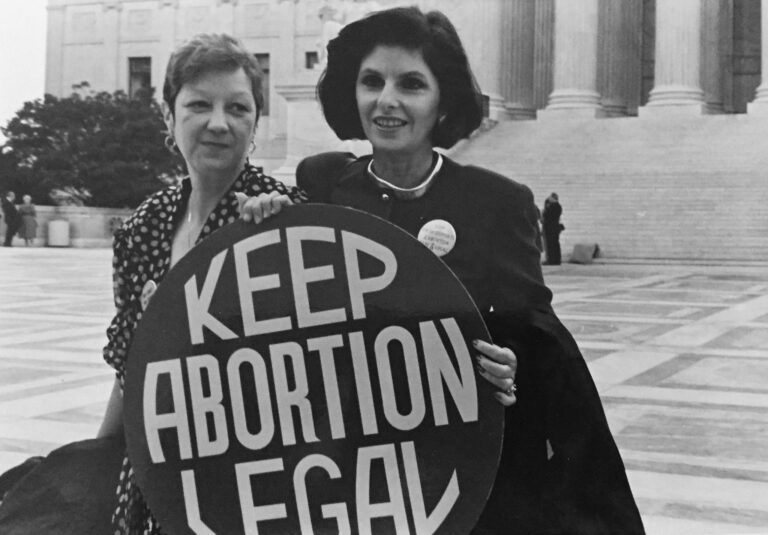In the wake of the Supreme Court’s decision to overturn Roe v. Wade, the left must rethink its approach to abortion access and employ new discourses and political strategies that go beyond the logic of “individual liberty” and “choice” in an effort to build a more solid basis for reproductive justice.
In a recent essay, Rachel Rebouché argues that the right to privacy which undergirded Roe was always an inadequate anchor for abortion. While it blocked state governments from criminalizing abortion, it also failed to ensure abortion access. In a post-Roe America, Rebouché writes, any legislative counter to the Court’s decision must mandate affordable abortion access, shifting the focus from reproductive rights to reproductive justice.
Such a shift in political strategy requires us to abandon the discourse of individual liberty embodied in slogans like “my body, my choice.” In a thoughtful essay from last year, Abby Minor writes that individualistic logic “reenacts mainstream white feminism’s most egregious error: the belief that liberalism, with its attendant concepts of privacy and choice, can simply be extended from the board room to the picking fields to the uterus.” Instead, we should not call solely for choice when it comes to our bodies, but equality.
Indeed, as Sara Matthiesen argues in “Abortion Is Not a ‘Choice’ Without Racial Justice,” vast inequalities have made “reproductive choice more myth than reality for an ever growing number of people.” Matthiesen writes that a shift from reproductive rights to reproductive justice is necessary in order to give more people the means to make real substantive choices about when and how to terminate a pregnancy or start a family.
An essay from abortion provider and writer Christine Henneberg also challenges our focus on “choice.” “What do we mean by choice?” she asks. “Did my patient’s induced delivery at twenty-two weeks constitute an abortion (albeit one that many would call ‘acceptable’)? Or was it a tragedy, a ‘choice’ that was never hers to make?” Acknowledging the moral complexity of many cases, she nonetheless affirms a profound commitment to the women her practice serves and the decisions they make.
Alongside more recent essays on abortion during COVID-19, the archival pieces below reflect on abortion’s troubled past and increasingly uncertain future—dissecting the morality and the medicine, comparing the role of abortion in different national and religious contexts, and exposing its place in the broader politics of reproduction, gender, and inequality.
Finally, in an archival essay from 1996, obstetrician Maureen Paul gives us a glimpse of what might be in store now that Roe has been repealed. “Life before Roe. I was a teenager back then, pregnant and desperate,” she writes. “Too terrified to make the midnight trip to the back alley with a password and hundreds of dollars.” But rather than a story of failure, Paul gives us a story of resistance that provides lessons for the fight that awaits us.
It is time to stop talking about Roe as the touchstone for abortion rights and to start imagining what law and policy can do to facilitate affordable and available services.
The right to reproductive health and agency is a compelling state interest.
Before Roe, abortion providers operated on the margins of medicine. They still do.
A doctor's case against COVID-19 abortion bans.
What the Indian constitutional tradition can teach about sex equality.
Forum
The idea that a fetus has rights cannot be bypassed as nonsense. We have to take the idea seriously.
Forum
Moralistic or not, misogyny is not about hating women. It is about controlling them.















